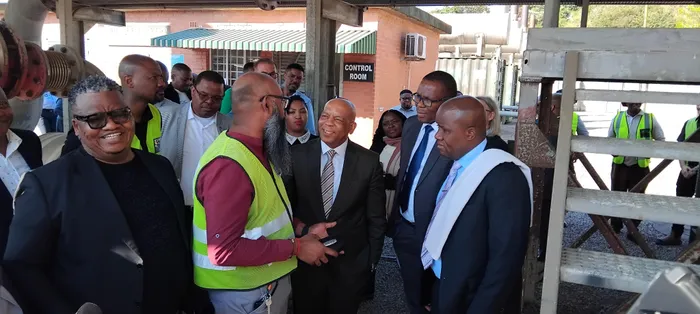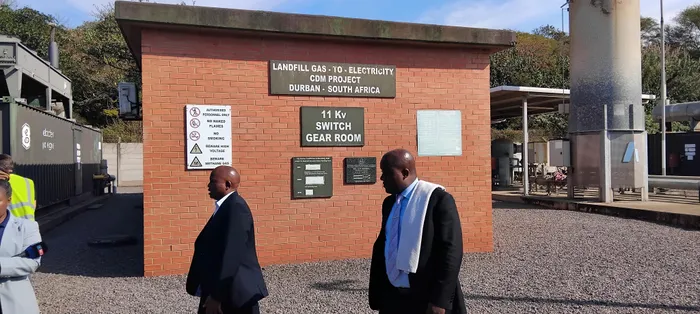
The Minister of Electricity and Energy, Dr Kgosientsho Ramokgopa, and eThekwini Mayor Cyril Xaba at the eThekwini Landfill Gas-to-Electricity project site in Durban. From left, eThekwini City Manager Musa Mbhele and far right, eThekwini Councillor Thembo Ntuli.
Image: Zainul Dawood
New electricity generation was on top of the cards for eThekwini Municipality on Friday.
The Minister of Electricity and Energy, Dr Kgosientsho Ramokgopa, joined by the Mayor of eThekwini, Councillor Cyril Xaba, spoke about the outcome of the municipality’s Section 34 application.
Xaba said that a Section 34 Ministerial Determination is a crucial mechanism that empowers municipalities to procure new generation capacity to meet specific energy needs and enhance energy security.
City officials and Ramokgopa also inspected the waste-to-energy plant in Springfield, Durban, that is owned by the municipality, highlighting the municipality's commitment to innovative and sustainable energy.
Xaba regarded it as a historic announcement that marked a critical milestone in the eThekwini energy strategic roadmap, which seeks to enhance energy security by diversifying energy sources and reducing reliance on the national grid.
“We are not only celebrating the decision by the Minister of Electricity and Energy to authorise the city to develop new electricity generation capacity, but we are also affirming our commitment to lead South Africa’s energy transition in a way that is secure, inclusive, and sustainable,” Xaba said
He added that eThekwini was the first metro in the country to receive this determination to procure new electricity generation capacity directly from Independent Power Producers (IPPs).
According to Xaba, this is a precedent-setting moment that reinforces the constitutional role of municipalities in ensuring they deliver quality services.
Detailing the history behind it, Xaba said that in 2021, eThekwini responded to the national energy crisis and initiated its electricity procurement programme through the Municipal Independent Power Producer Procurement Programme (MPPPP).
He said this decision was driven not only by necessity, but by a forward-looking vision of building a decentralised, diversified, and resilient municipal energy system.
By July 2021, eThekwini issued a technology-agnostic Request for Information (RFI) to the market, targeting 400 megawatt (MW) of renewable energy. This move allowed eThekwini to engage industry stakeholders, assess investment appetite, and lay the groundwork for meaningful public-private partnerships.
A year later, the municipality's 400 MW business case received full endorsement from the KwaZulu-Natal provincial government. Subsequently, the National Treasury approved the project, positioning eThekwini as a national pioneer in municipal-led power procurement.
In 2023, the municipality convened the first Energy Transformation Summit and submitted a Section 34 Determination application, which received the full attention of Ramokgopa.
By October 2024, Ramokgopa issued the draft Section 34 determination to NERSA, which launched public participation in March 2025. On Friday, the final approval of the Ministerial Determination gave the green light to move to the next phase of the Request for Proposals (RFP).
The RFP for Solar PV will be issued in December 2025, with the construction expected by September 2027. Xaba said that the Gas-to-Power RFP will follow in 2026.
He explained that this programme will allow eThekwini Municipality to procure 400 MW of new generation capacity - 100 MW Solar PV and 300 MW Gas to Power (GTP), with a focus on dispatchable, reliable, and low-carbon energy technologies. Our energy mix is clearly articulated in our Integrated Development Plan (IDP).
zainul.dawood@inl.co.za

The Landfill Gas-to-Electricity project site in Springfield, Durban.
Image: Zainul Dawood